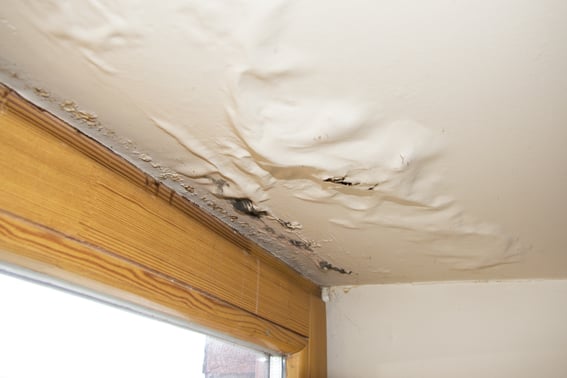
For most of us, purchasing a home is one of the biggest investments we will make in our lives, both financially and emotionally. We spend years collecting memories and possessions within those walls, and we trust our homes to keep us safe from harm. It’s crucial to take care of your home to protect your investment and your family.
One way to do this is to regularly inspect your roof, both internally and externally, for signs of water damage. Water damage from a roof leak can damage your home and undermine its safety. It’s important to know how to spot the signs of a leak so you can call a professional before the issue escalates.
Common Signs of Water Damage
Unfortunately, the first signs of potential water damage typically aren’t obvious. Water damage from a leaky roof can first manifest in subtle ways, such as a musty smell in an upstairs bedroom or the attic, an insect infestation, or a stain on the ceiling. You might notice bubbled paint on the ceiling, walls, or floor, which can happen when water passes through the drywall and is being held back only by the layers of paint.
Trapped water can cause a serious mold or mildew problem. If you don’t catch it soon enough, the water can pass through the ceiling and drip down inside your walls and flooring. It can also collect in light fixtures and on top of cabinets.
Repairing Water Damage
The first step in repairing water damage is to contain and clean up the water that’s leaking into the home. Depending on their skill and confidence level, homeowners can often handle this on their own. For example, if water is dripping from the ceiling, place a bucket on the floor underneath the leak to catch the water. Next, thoroughly dry out all carpet, furniture, and anything else that’s been exposed to the water. This is essential to prevent mold growth. If the water damage is from an external leak, you can clean out your gutters and check to see whether water was overflowing from them into the house. Be sure to inspect your roof to see if there are any damaged shingles that are letting water in.
If the roof leak is substantial or the result of a severe storm, it could cause standing water to accumulate in your basement. This, in turn, could compromise your home’s foundation. In this instance, it’s a good idea to contact a professional right away so you can prevent any further damage. Although they won’t be able to repair the roof leak until the storm has passed, it’s still important to contact a professional right away and contain the leak as much as you can while riding out the storm.
After the water is contained, it’s time to begin fixing the root of the issue. When in doubt, it’s best to call in a professional, especially if the water damage is severe enough to warrant replacing drywall, water supply lines, shingles, or other parts of your roof. A roofing professional will be able to identify the source of the damage and repair it properly.
If the ceiling has been damaged, the waterlogged drywall and insulation will need to be completely removed and replaced. A professional will be able to tighten, repair, or replace water supply lines as well. For an external roof leak, they will be able to inspect and replace any damaged shingles, gutters, and leaking flashing and vents.
Preventing Water Damage
While water damage can be catastrophic to your home and your finances, it is preventable. Consider adding ice dam protection along the edge of your roof to stop melting ice from seeping under your shingles and into your attic or upper level.
Regular maintenance is your best defense against significant water damage. Search for leaks both inside and outside your home on a consistent basis, especially after storms and as the seasons change. For leak prevention inside your home, regularly inspect appliances such as your dishwasher, faucets, bathtubs, and toilets to ensure everything is operating smoothly.
Insurance Coverage for Water Damage
Water damage can damage your financial health as well as your home’s structural integrity. Examine your homeowners' insurance policy to determine the types of water damage it covers. Luckily, roof leaks (as well as burst pipes, plumbing issues, and damage from storms or fire) are the most common events covered by homeowners insurance policies.
At Pacific, our experienced professionals can help you protect your home from water damage by providing both routine maintenance and emergency repairs. Contact our team, and we can get your next maintenance scheduled!